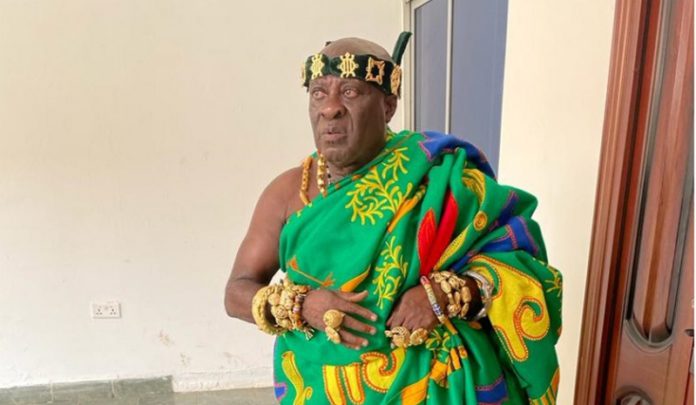One reason for the increased use of imprecation in the pursuit of justice, especially in domestic cases, is the slow speed of case adjudication in the law courts.
This is according to the Asantehene’s Chief Priest, Baffour Asabere Ababio Kogyawoasu III, who appeared as a guest on Luv FM to talk on Ghanaian Belief Systems, Curses and Taboos as part of the Ghana Month series.
“I would advise that we do not indulge in the practice because it can lead to death. It’s not a good practice; it does not respect age, neither riches nor poverty,” he said. “What leads to curses is often not pleasant, however it should be discouraged”.
Imprecation, or curse by spoken word, is a common practice in some Ghanaian cultures, especially among the Akan.
Popularly known as ‘duabo’ among the Asantes, such imprecations come in the form of invocation of supernatural powers or river deities aimed at killing, causing harm or misfortune on a victim.
Such curses often arise out of conflicts, selfishness, enmity, deceit and anger.
ALSO READ:
- Elvis Kwashie, the man who asked for a miracle but didn’t get it
- Old video shows policeman involved in bullion van robbery won overall best drill in police training school
- How police officers involved in robberies were exposed; the inside story [Audio]
“You should be worried when someone casts curses on you; it’s important you take steps to reverse the curse, because no medical care can save you. Pastors should also not make the mistake of attempting to reverse such curses because it’s not within their domain,” stated Otumfuo’s Nsumankwaahene.
Victims of duabo are believed to suffer from spiritual afflictions including protruding stomach, swollen legs, loss of source of livelihood, mental illness, heart failure and death.
According to the Otumfuo’s Nsumankwaahene, the gods as spirits sit on cases as it pertains to traditional adjudication of cases in the palace.
He said though curses can be overturned, one has to first identify the source and show remorse which improves chances of finding favor with the gods.
“A curse can be reversed depending on remorse. But when you have to die, you will die,” said the Chief Priest.
The traditional authority in the Asante Kingdom has placed a ban on curses.
The Nsumankwaahene, however, observed individuals swear regardless of the consequences, because of the pain of being wrongly accused or desiring retaliation for harm done by an unknown person.
Baffour Asabere Ababio Kogyawoasu says as far as incidents of crime, lies, deceit and other vices continue to rise in society, people’s quest to use imprecation to seek justice will continue to increase.
“Duabo is deemed as a fast track,” he noted. “The nature of your dreams is one sign to know you’ve been cursed. Strange and unfamiliar dreams are one such avenue”.

